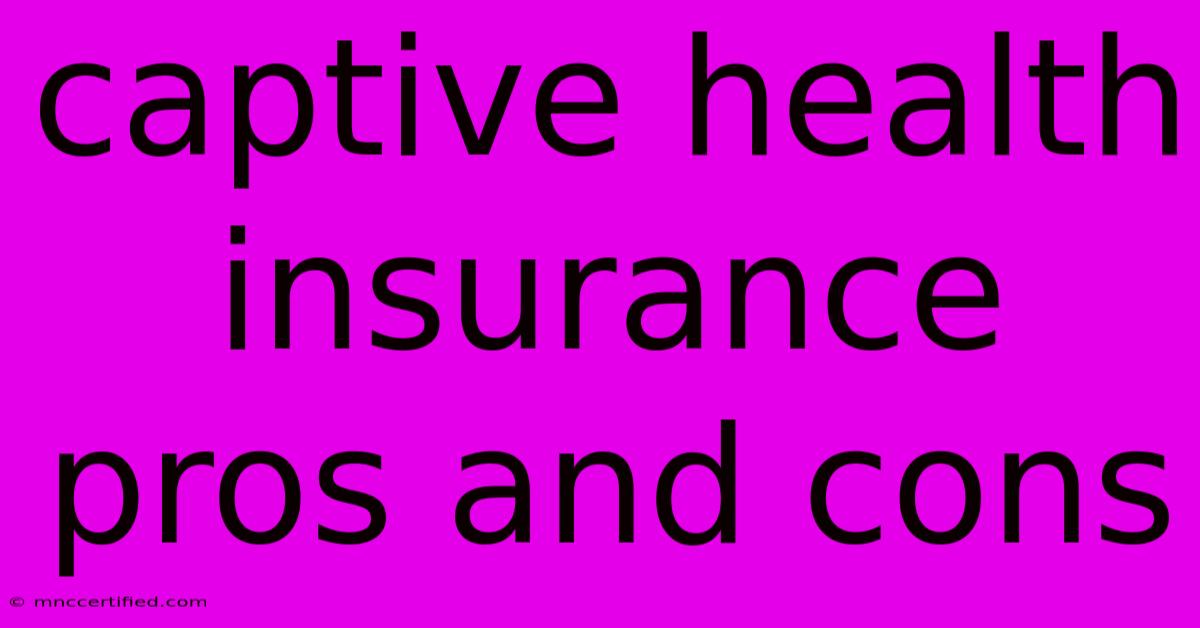Captive Health Insurance Pros And Cons

Table of Contents
Captive Health Insurance: Pros and Cons for Your Business
In the ever-evolving landscape of healthcare, businesses are constantly searching for cost-effective solutions to manage employee health insurance. One option gaining traction is captive health insurance, a self-funded model where employers take control of their healthcare risk and expenses. But is it the right fit for your organization?
This article will delve into the pros and cons of captive health insurance, providing a comprehensive overview to help you make an informed decision for your business.
What is Captive Health Insurance?
A captive health insurance program involves forming a captive insurance company, typically a wholly-owned subsidiary, to underwrite and manage the health insurance needs of the parent company and its employees. Unlike traditional health insurance, where premiums are paid to a third-party insurer, captive programs allow the employer to pool risk and control claims payments.
Pros of Captive Health Insurance
- Cost Savings: Captives have the potential to significantly reduce healthcare costs. This stems from:
- Eliminating administrative fees and profit margins typically associated with traditional insurance companies.
- Greater control over claim payments allowing for negotiation and potential cost reductions.
- Incentivizing healthy behavior with wellness programs and preventive care, leading to lower utilization and expenses.
- Customization: Captive programs offer flexibility in designing a health plan that meets the specific needs of your workforce. This includes tailoring benefits, deductibles, and coverage to suit your budget and employee demographics.
- Increased Control: By taking charge of your healthcare risk, you gain greater control over the decision-making process. This includes selecting providers, negotiating rates, and managing claim payments.
- Improved Risk Management: Captives allow for proactive risk management strategies. You can implement preventative care programs, conduct health risk assessments, and build reserve funds for unexpected expenses.
- Long-term Stability: By pooling risk and controlling costs, captive programs can provide long-term stability and predictability for your healthcare spending.
Cons of Captive Health Insurance
- Initial Setup Costs: Establishing a captive insurance company requires significant initial investment, including legal fees, regulatory compliance, and administrative infrastructure.
- Administrative Complexity: Managing a captive requires dedicated resources and expertise in areas such as claims processing, risk management, and actuarial analysis.
- Financial Risk: As the self-insured entity, your business assumes the financial risk associated with healthcare claims. If you experience a high volume of claims or a catastrophic event, you could face significant financial liability.
- Regulatory Requirements: Captive programs must comply with state and federal regulations, which can be complex and subject to change.
- Potential for Volatility: Fluctuations in healthcare costs and claim patterns can create volatility in your captive's financial performance.
Is Captive Health Insurance Right for Your Business?
The decision of whether to implement a captive health insurance program depends on several factors, including:
- Company Size and Employee Demographics: Captive programs are generally best suited for larger companies with a diverse employee population.
- Financial Resources and Risk Tolerance: You must have the financial capacity and willingness to accept the financial risk associated with self-funding healthcare.
- Access to Expertise: Establishing and managing a captive requires expertise in insurance, finance, and healthcare.
- Regulatory Environment: Understanding the regulatory landscape and compliance requirements is crucial.
Before implementing a captive health insurance program, thoroughly assess your organization's needs, resources, and risk tolerance. Consulting with qualified professionals in insurance, finance, and healthcare is essential to make an informed decision.
Keywords: Captive Health Insurance, self-funded health insurance, healthcare costs, cost savings, risk management, customization, benefits, deductibles, financial risk, regulatory requirements, employee health insurance, company size, financial resources, risk tolerance, access to expertise, regulatory environment.

Thank you for visiting our website wich cover about Captive Health Insurance Pros And Cons. We hope the information provided has been useful to you. Feel free to contact us if you have any questions or need further assistance. See you next time and dont miss to bookmark.
Featured Posts
-
Nepal Triumphs In U 19 Womens T20 Opener
Nov 09, 2024
-
Obituary Actor Tony Todd 1954 2024
Nov 09, 2024
-
Irelands World Cup Quarterfinal A Chaotic End
Nov 09, 2024
-
Grammys 2025 Nominees For Top Categories
Nov 09, 2024
-
Rashida Jones Pays Tribute To Father Quincy Jones
Nov 09, 2024